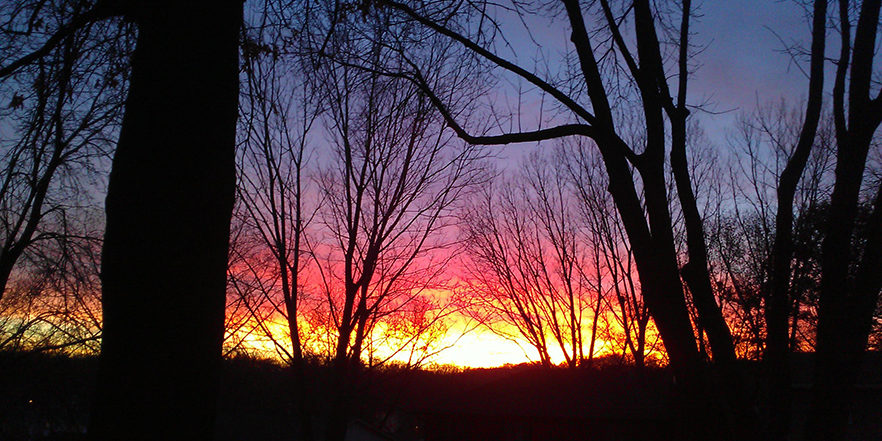The Stephen Schwartz musical Pippin is a parable about the meaning of life set in early medieval Christendom. The protagonist, Pippin, fictional son and heir to the throne of the Holy Roman Emperor, Charlemagne, embarks on a quest to find his purpose in life, his “corner of the sky.” “Rivers belong where they can ramble,” he sings, “Eagles belong where they can fly … I’ve got to be where my spirit can run free! Gotta find my corner of the sky!”
Throughout his quest to find meaning and to become extraordinary, Pippin is accompanied by a sadistic chorus, goading him into one failed attempt at fame, glory and conquest after another. In one particularly poignant interlude, Pippin, ever the idealist, commits patricide so that he can rid the Empire of tyranny, and instead rule in his father’s place with equanimity and benevolence. After a climactic confrontation with his father, Pippin plunges a knife into his father’s back (with Charlemagne’s full knowledge) and is crowned “King Pippin.” The entire chorus rejoices that a profound new day is dawning. “Morning Glow is almost here!” they proclaim. (https://www.youtube.com/watch?v=ERpF8iXqVLY) But their jubilation is short-lived.
The dream of a benevolent, altruistic emperor unravels quite expeditiously once Pippin realizes that the structure of the Empire itself is still intact, and even a benevolent tyrant is still a tyrant. He thought that by killing his father, he would kill tyranny itself, but the plan was flawed. Nothing changes. Pippin’s reign as a benevolent Emperor is for naught. His rule has no efficacy whatsoever in bringing about the change he imagined. What follows for Pippin is abject despair, and he pleads with the Lead Player, a magician of sorts, to bring back his father from the dead so that Charlemagne will continue to rule as Emperor in the bloody conquest that is Christendom’s heritage.
Lesson learned: If you want to change the world, change the world-view. “In Berry’s view, a central cause of the West’s ecological hostility was its separation from nature—a separation that was at once spiritual, religious, psychological, emotional, intellectual, and philosophical. The root of the eco-destruction was an anthropocentric (human-centered) Western worldview that saw an existential gulf, a “radical discontinuity,” between the human and natural worlds. To stop this assault on the Earth, Berry told us in Assisi in 1991, requires recognizing that our cultural story is dysfunctional. To change the world, we have to change the worldview” (Drew Dellinger, “Change the Worldview, Change the World,” Kosmos, 2018). The entire narrative must be rewritten, the dream reimagined, the paradigm shifted to allow for a wider “We.”
Peripatetic sage and philosopher of evolutionary consciousness, Bayo Akomolafe, puts it this way, “It means we have to rethink everything” (Bayo Akomolafe, “Deep Dive,” https://www.youtube.com/watch?v=ho5VFU8YFnk). This is no easy task, when thought itself is co-opted by language, and language is bound to enculturated metaphor, which is infused, or rather, completely saturated with anthropocentrism and a notion of separateness. Yet, the post-human critique is beginning to take hold. Humanity is not at the center, not at the top of any presumed hierarchy of being. We are simply embedded in a vast, mysterious unfolding, the wider “We.” We are only very recently grappling with the notion of “entanglement,” or the profound inter-connection of all being. It is only the beginning of our emerging human consciousness that we are not separate from the journey of the universe, but a teeny, tiny iteration of its 13.7-billion-year story.
Incidentally, the hero of the story above, Pippin, only nearly escapes attempted suicide at the end of the show, which has been plotted by the mob-chorus that is betting on his despair to bring about the Grand Finale for their spectacle. If he will just set himself aflame, “The power and the glory, all there at your command!” they assure him, and he will become “one, perfect flame!” In an act of resistance and courage, Pippin refuses to take his own life for their entertainment, renounces his quest to be “extraordinary” and its pretense of “specialness,” so that he can settle down to an “ordinary” life with his new-found family. “If I’m never tied to anything,” he realizes, “I’ll never be free.” It is his connection in the microcosm to the love of his family that connects him to the wider “We.” This realization gives him the courage to transcend his own aspirations for exclusive ”specialness,” and to recognize that his identity—his being—is tied to Other through love of others.
Are we ready to enter into the realm of the imaginal, where the wider “We” awaits us? Are we ready to sacrifice our own specialness for the love that leans into the common good? Are we ready to rethink EVERYTHING? Are we ready to change our world-view? If we can just risk the loss of our self-centeredness, and realize that our connection with the wider “We” eclipses the egoic “me,” we might see it at last … Morning glow!
“Morning Glow” (https://www.youtube.com/watch?v=ERpF8iXqVLY)
by Stephen Schwartz, from the musical Pippin[PIPPIN]
Why won’t my hands stop shaking
When all the earth is still
When ancient ghosts are waking
So many steps need taking
So many plans need making
I think I will
I think I willMorning glow, morning glow
Starts to glimmer when you know
Winds of change are set to blow
And sweep this whole land through
Morning glow is long past dueMorning glow fill the earth
Come and shine for all you’re worth
We’ll be present at the birth
Of old faith looking new
Morning glow is long past dueOh, morning glow, I’d like to help you grow
We should have started long ago
SoMorning glow all day long
While we sing tomorrow’s song
Never knew we could be so strong
But now it’s very clear
Morning glow is almost hereMorning glow, by your light
We can make the new day bright
And the phantoms of the night
Will fade into the past
Morning glow is here at lastMorning glow, by your light
We can make the new day bright
And the phantoms of the night
Will fade into the past
Morning glow is here at last[ALL]
At last
—Laura Weber, Prairiewoods associate director and retreats coordinator


